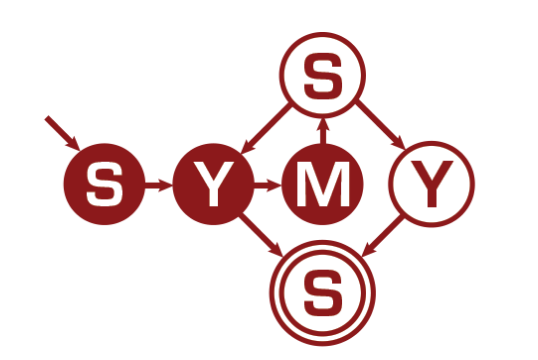Humans of SymSys: Marika Buchholz
/“SymSys is all about learning a way of thinking (within the core) that you can then apply to many different subjects (inside or outside of your concentration).”
Marika is a junior majoring in Symbolic Systems with a Learning concentration. She’s interested in learning from many different angles: how/whether we can use technology to help people learn, whether musical ability/experience plays a role in tonal language acquisition... Here, she talks about the importance of the growth mindset, reaching out to others for advice and insight, and perseverance. Marika exemplifies using a SymSys education to learn how to think about and address the issues that are important to her!
What drew you to the SymSys major?
Freshman year I tried lots of majors out like CS, MCS, linguistics, and Econ, but I think I always had a gut feeling that I wanted to do SymSys. I'd always been interested in language, and I wanted to explore fields like computer science and philosophy, both of which I had little to no background in before coming to Stanford. Now, my favorite part of SymSys is that my classes each quarter span many areas of interest, and slowly the connections among them are growing!
What is your concentration and why did you choose it?
Although I’ve been declared SymSys for awhile now, I’ve only recently decided to concentrate in Learning. I’m broadly interested in how people learn, as well as how (or whether!) we can use technology to help people learn. I haven’t taken many classes in my concentration yet, but I’m excited to use the concepts I’ve learned in my CS, psych, and linguistics classes to explore topics like educational neuroscience, learning/design/technology, and applied sociolinguistics/language education.
What’s your favorite SymSys-related class that you’ve taken so far?
Two classes stand out for me: Ed101 (Introduction to Teaching and Learning) and CS103 (Mathematical Foundations of Computing). Taking Ed101 has been an absolutely fantastic way to get a broad picture of the field of education and reflect on my own experiences as a student for the past ~15 years. I also loved CS103, because I learned techniques and mindsets for learning (such as growth mindset and directed practice) that have helped me so much in other classes.
What’s the coolest (loosely) SymSys-related topic that you’re excited about right now?
I grew up speaking Japanese, and I’ve taken two years of Chinese at Stanford. I love looking at the similarities between the two languages, as well as how the character systems in both languages have changed over time. I’m also fascinated by second language acquisition, specifically for tonal languages, and whether musical ability or experience plays a role in how well we can learn those tones!
What do you think about the perceived "STEM-humanities" divide? Does SymSys bridge this gap?
In my view, thinking of STEM and humanities as two irreconcilable entities is dangerous, because working on technical problems without a knowledge of society, especially here in Silicon Valley, can lead to doing harm. I would say, though, that if you are intentional about it, SymSys can bridge the “STEM-humanities” gap. SymSys is all about learning a way of thinking (within the core) that you can then apply to many different subjects (inside or outside of your concentration). Your focus topic within SymSys can be about so many things that aren’t touched upon specifically in the core, from education to digital democracy. For me, learning more about people and society is just as important as exploring the questions addressed in SymSys, and I feel lucky to have found a way to do both congruously.
What is one piece of advice you'd like to offer to younger students?
If you’re considering SymSys, there’s a chance that you have something specific you really want to explore (like AI or NLP). If you’re anything like me, though, you’ll spend a fair bit of time being wildly indecisive about what classes to take, what to major in, what to do over the summer, or what to do after graduation(?!). My advice is to go talk to as many people as you can who can help you make your decision. If you talk to enough people, you will reach insights you hadn’t even thought about before. Also, do SymSys at your own pace. If your grades in a class are lower than you wanted, or if you need to drop classes and take them another quarter, don’t immediately consider switching majors. I almost did switch out of SymSys (twice!) due to feeling behind academically, but I’m so glad I stuck with it, because now I found a niche within the major that I really love.
Marika is one of many profiles featuring selected alumni, undergraduates and graduates who are involved in the Symbolic Systems community.


